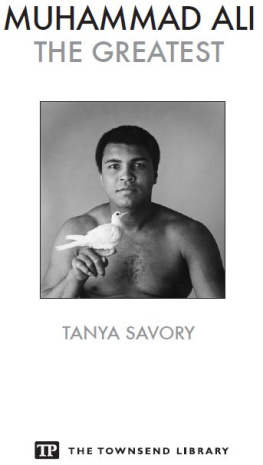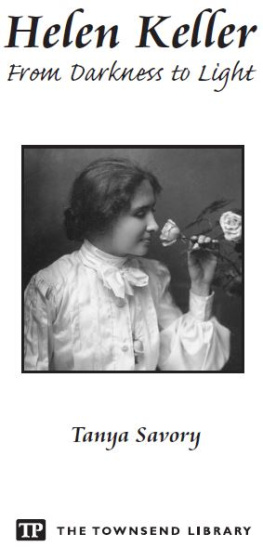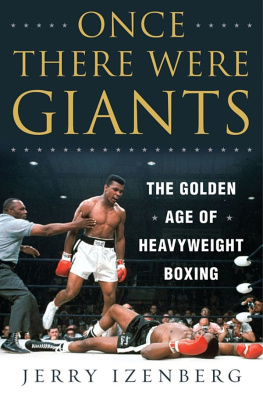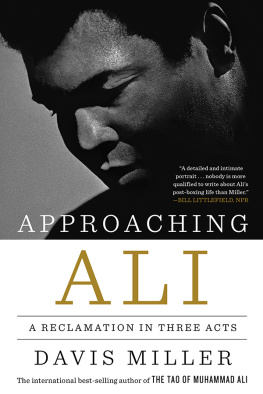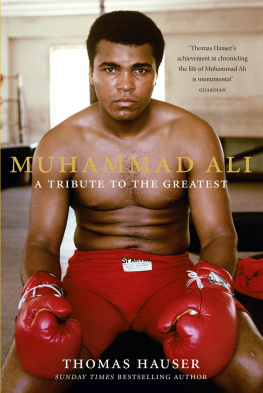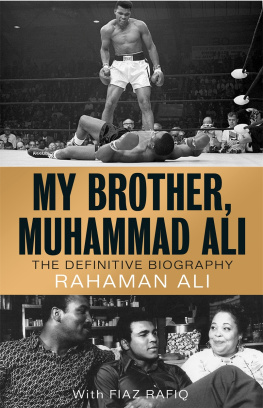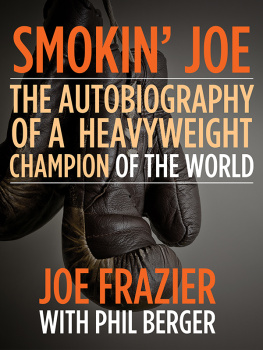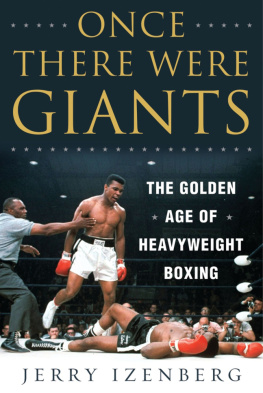I would like to be remembered as a man who never looked down on those who looked up to him... who stood up for his beliefs... who tried to unite all humankind through faith and love. And if thats too much, then I guess Id settle for being remembered only as a great boxer who became a leader and champion of his people.
And I wouldnt even mind if folks forgot how pretty I was.
CHAPTER 1
You want me to do what?
Rudy Clay looked at his older brother doubtfully.
Throw rocks at me! Ill bet you anything you cant hit me.
Rudy picked up a small stone and pulled his arm back. But he couldnt bring himself to throw it. After all, his older brother was his best friend.
Come on! Cassius shouted from across the front yard of their small home in Louisville, Kentucky. Im too fast. Watch! He began dancing around, darting and dodging in order to prove to Rudy that he was too swift on his feet to be hit. He bobbed his head back and forth until Rudy began laughing.
Okay, watch out!
Rudy began tossing rocks slowly at Cassius. But when his brother easily dodged every one, Rudy started throwing faster and faster. Finally, he began hurling two rocks at a time. Not a single rock even grazed Cassius.
Man, Cash, you are too fast, Rudy finally said, shaking his head.
Thats right! Cassius shouted gleefully as he ran around the yard with his hands over his head in a victory dance. Im the best!
Even at twelve years old, the boy who would one day be known to the entire world as Muhammad Ali was full of confidence, strength, and excess energy.
He could talk so fast, just like lightning. And he never sat still, Cassiuss mother, Odessa, recalled. I was holding him one time when he was six months old, and you know how babies stretch? He had little muscular arms and he accidentally hit me in the mouth when he stretched. It loosened my front tooth and I had to have it pulled out! So I always say his first knockout punch was in my mouth.
Cassius and Rudy had so much energy that they were known as the wrecking crew in their Louisville neighborhood, since things always seemed to get broken when the two boys were around. Baseballs got thrown through windows, flowerpots got knocked over, and dishes got dropped. When the boys werent breaking things, they rode their bikes, played marbles, and organized neighborhood games of tag and football. In many ways, Cassius and his younger brother lived the typical lives of boys growing up in the 1940s and 1950s.
But in many more ways, their lives were far different from those of most American boys during that era.
In parts of the South during this time, black people were separated from white people. Many white people believed that blacks were second-class citizens and that they were not as smart, as hardworking, or even as clean as white people. For this reason, many cities throughout the South, including Louisville, had what were known as Jim Crow laws. These laws ensured that white people would not have to be bothered by the presence of black people. Blacks had to use separate bathrooms, water fountains, and even swimming pools. They were forced to the back of buses and into stuffy, crowded balcony seats in movie theaters. Black people were often not allowed to even enter white-owned restaurants. Signs on the doors bluntly announced, No Colored People Allowed.
One of Cassius Clays earliest memories was of walking downtown with his mother on a very hot summer day. He was extremely thirsty and began crying. Odessa Clay looked around for a black water fountain, but she couldnt find one. Finally, in desperation, she and Cassius entered a small diner.
Im sorry, but I was wondering if you could please let my son have a glass of water, Mrs. Clay said politely to the white man behind the counter. She gestured toward five-year-old Cassius, who had tears streaking his face. Hes just so thirsty.
The man glared at Odessa, shook his head, and pointed toward the sign by the door.
Get out. Theres nothing I can do for you.
Young Cassius held tightly to his mothers hand and stared at the white mans hateful face. He would never forget how that moment felt. It was the moment that Cassius realized that he lived in a world of separation. A black writer who lived in Louisville around the same time wrote, On my side of the veil everything was black: the homes, the people, the churches, the schools, the Negro park with Negro park police.... There were two Louisvilles and, in America, two Americas.
As Cassius grew older, he quickly learned just how separated the two Louisvilles were. One afternoon when he was out riding his bike with a friend, they turned down an unfamiliar street and found themselves in a white neighborhood. People turned and stared at the boys. A woman hurried out of her yard and onto the safety of her porch. Finally a man pulled up beside the boys in his car and shouted, Niggers, go home!
Not long after this, Cassius went to a Halloween party and noticed that a girl who was dressed as a superhero had painted her face white. When Cassius asked the girl why she had made her face white, she replied, Because my sister told me there is no such thing as a black superhero.
She was right, Muhammad Ali would write many years later. When I turned on the television, everyone was always white. Superman was white. They even made Tarzan, king of the jungle in Africa, a white man. Nothing good was reflected in our image. Even at that early age, I could see that something was very wrong. I didnt understand it. I thought my skin was beautiful.
A simmering anger and frustration began brewing deep inside the young Cassius Clay. It bothered him that his fathers talent as a painter was never taken seriously, simply because of the color of his skin. While Mr. Clay dreamed of being an artist, he was reduced to painting signs for beer, groceries, and gasoline for a living. Even worse, Cassius watched his mother leave before daylight every day to go to a house in a fancy white neighborhood where she cleaned, cooked, and took care of babies for twelve hoursfor barely thirty cents an hour. There was often not enough for Cassius and his brother to eat unless their mother spent her entire days earnings on food for a complete dinner. Rain leaked through the roof of the Clays home, because there was no money to fix it. Clothes came from Goodwill, and even when shoes got so worn out that there were holes in them, the two boys had to wear them to school.
My father became an expert at cutting out cardboard and putting it in the bottoms of our shoes, Ali later said in his autobiography.
The separation, the name-calling, and the lack of opportunity for his parents may have frustrated and confused Cassius Clay, but one event in particular made him furious. In a small town in Mississippi, a young boy who was the same age as Cassius went into a grocery store to buy some candy. His name was Emmett Till. Like Cassius, 14-year-old Emmett was outgoing and friendly, and he talked to everyone. According to the white woman who was working behind the counter at the store, however, Emmett didnt just speak to herhe flirted with her.
Some of the white men who lived in the small Mississippi town heard about Emmitts crime and hunted him down. They beat him senseless and then drowned him in the nearby river. His body was found several days later. Heartbroken and outraged, Emmetts mother refused to let her son be buried until mourners and newspaper reporters saw the boys bashed-in and swollen face. Two pictures of Emmett, one of him handsome and smiling and one of him in his coffin, were printed in black newspapers nationwide. Cassius stared at the pictures in horror, and then the horror turned to fury.
I couldnt get Emmett out of my mind, Ali later wrote. Looking at Emmetts face was a grim reminder of just how limited and brutal life could be for a black person in the South. One evening, I thought of a way to get back at white people for his death.

